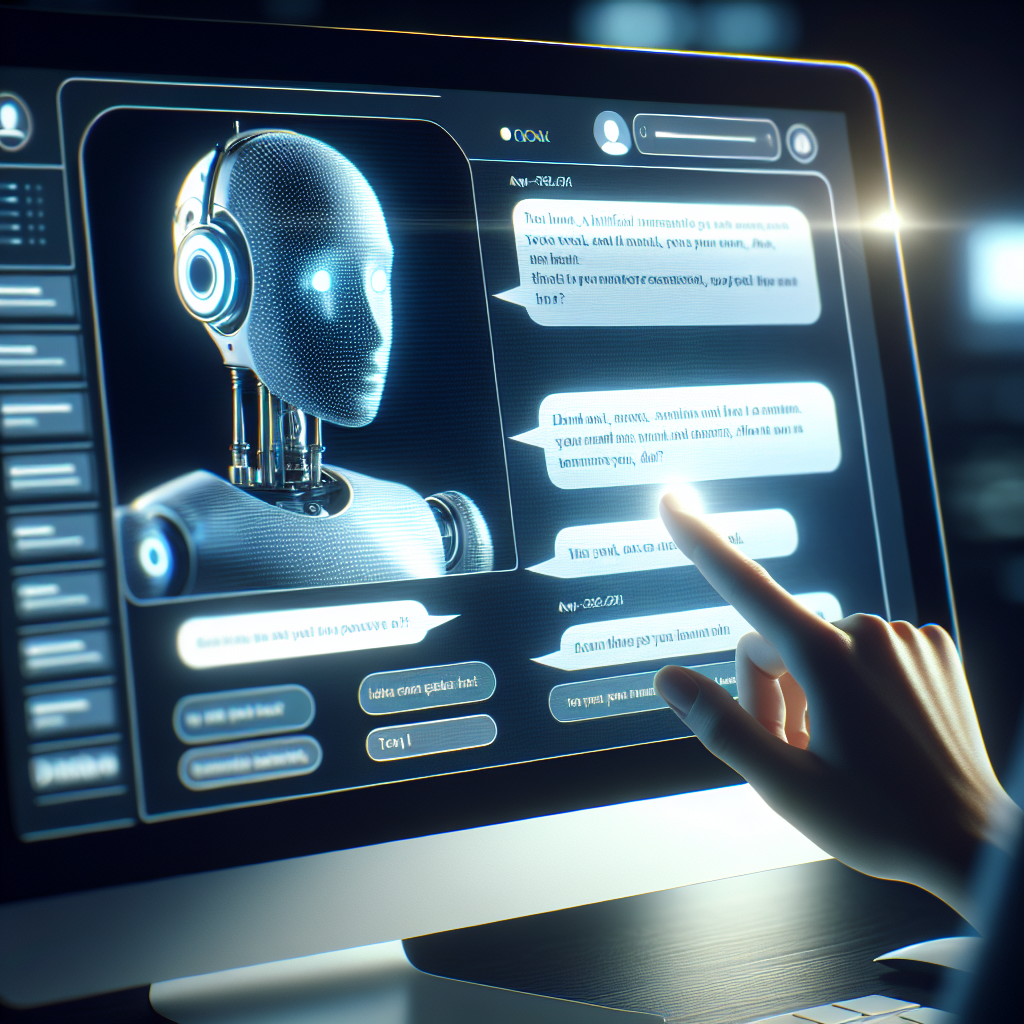How AI Chatbots Revolutionize Customer Support

In today’s digital age, the adoption of AI chatbots for customer support has become a game-changer for many businesses. These intelligent systems are designed to simulate human-like conversations and provide instant responses to customer inquiries. By leveraging advanced technologies such as machine learning and natural language processing, AI chatbots can understand and interpret customer queries more accurately than ever before.
The effectiveness of AI chatbots lies in their ability to handle a wide range of customer interactions, from answering common questions to resolving complex issues. This not only streamlines the customer support process but also frees up human agents to focus on more critical tasks. As a result, businesses can achieve higher levels of efficiency and customer satisfaction.
Moreover, the integration of AI chatbots into customer support systems helps reduce operational costs significantly. By automating repetitive tasks and providing 24/7 support, companies can save on manpower and operational expenses. The scalability of AI chatbots ensures that businesses can handle increasing volumes of customer interactions without compromising on the quality of service.
Ready to dive deeper into the world of AI chatbots and create your own? Learn AI Chatbot Course today and start revolutionizing your customer support strategy!
Benefits of AI Chatbots in Customer Support

Implementing AI chatbots for customer support offers a multitude of benefits that can significantly enhance a business’s customer service operations. One of the most notable advantages is the improvement in response time. Unlike human agents who can handle only one query at a time, AI chatbots can manage multiple conversations simultaneously, ensuring that customers receive immediate assistance without any waiting time.
Another critical benefit is the consistency in responses. Human agents may provide varying answers to the same question due to differences in training and experience. In contrast, AI chatbots deliver standardized and accurate information every time, thereby minimizing the risk of misinformation and improving the overall customer experience.
Cost savings are another significant advantage of using AI chatbots. By automating routine inquiries and tasks, businesses can reduce the need for a large customer support team. This not only cuts down on labor costs but also allows human agents to focus on more complex and high-value interactions that require a personal touch.
AI chatbots also offer the benefit of 24/7 availability. Customers can reach out for support at any time of the day or night, even outside of regular business hours. This ensures that customer queries are addressed promptly, leading to higher satisfaction rates and fostering customer loyalty.
Additionally, AI chatbots can analyze customer interactions to gain valuable insights into customer behavior and preferences. This data can be used to refine marketing strategies, improve product offerings, and enhance overall customer engagement.
How AI Chatbots Improve Efficiency

AI chatbots are transforming the landscape of customer support by dramatically improving efficiency across various dimensions. One of the most impactful ways they achieve this is through automation of repetitive tasks. Tasks such as answering frequently asked questions, processing common requests, and providing basic information can be efficiently handled by AI chatbots, freeing up human agents to focus on more complex queries.
Another way AI chatbots boost efficiency is by facilitating quick and accurate information retrieval. When customers interact with chatbots, they can instantly access a wealth of information from a centralized database. This eliminates the need for lengthy searches and reduces the time spent on each interaction, leading to faster resolution times.
Additionally, AI chatbots can seamlessly integrate with various business systems and platforms, such as CRM software, ticketing systems, and knowledge bases. This integration allows for a streamlined workflow, ensuring that all relevant data is accessible in one place and reducing the time and effort required to switch between different systems.
AI chatbots are also adept at handling high volumes of customer interactions simultaneously, which is particularly beneficial during peak periods. This capability ensures that no customer query goes unanswered, and the overall support process remains smooth and efficient.
Furthermore, AI chatbots can use natural language processing (NLP) to understand and interpret customer queries accurately. This reduces the likelihood of miscommunication and ensures that customers receive precise and relevant responses, thereby minimizing the need for follow-up interactions and improving first-contact resolution rates.
By leveraging these capabilities, AI chatbots not only enhance the efficiency of customer support operations but also contribute to a more satisfactory customer experience.
Cost Reduction Through AI Chatbots
Implementing AI chatbots in customer support can lead to substantial cost reduction for businesses. One of the primary ways this is achieved is through the automation of routine tasks. By handling common inquiries and repetitive tasks, AI chatbots reduce the need for a large customer support team, thereby lowering labor costs.
Additionally, AI chatbots operate around the clock, providing 24/7 support without incurring the costs associated with overtime pay or shift differentials. This continuous availability ensures that customer queries are addressed promptly, regardless of the time of day, which can significantly decrease the need for after-hours staff.
Another financial benefit stems from the reduced training expenses. Traditional customer support roles require extensive training to ensure agents are knowledgeable and effective in their roles. AI chatbots, on the other hand, can be updated with new information and protocols instantly, eliminating the need for ongoing training sessions and reducing associated costs.
Moreover, AI chatbots help to minimize operational costs by streamlining workflows. Integrating chatbots with existing business systems such as CRM and ticketing platforms ensures that customer data is managed efficiently, reducing the time and resources spent on manual data entry and management.
AI chatbots also contribute to cost savings by enhancing overall productivity. With chatbots handling a significant portion of customer interactions, human agents can focus on more complex issues that require a personal touch. This optimal allocation of resources leads to better performance and higher efficiency, ultimately reducing operational costs.
Furthermore, the scalability of AI chatbots means they can handle increased customer interactions without the need for proportional increases in staffing. During peak periods, businesses can rely on chatbots to manage the surge in queries without incurring additional expenses.
By leveraging these cost-saving advantages, businesses can enhance their customer support operations while maintaining a more sustainable and efficient cost structure.
Enhancing Customer Satisfaction

One of the most compelling advantages of using AI chatbots in customer support is their ability to significantly enhance customer satisfaction. These intelligent systems can provide instant responses to customer queries, drastically reducing wait times and ensuring that issues are addressed promptly. This immediate interaction creates a positive experience, which is crucial for maintaining customer loyalty.
AI chatbots are equipped with advanced natural language processing capabilities, allowing them to understand and respond to customer inquiries with a high degree of accuracy. This leads to more personalized and relevant interactions, which can make customers feel valued and understood. By analyzing previous interactions and customer data, chatbots can tailor their responses to meet individual needs, further boosting customer satisfaction.
Another key factor contributing to enhanced customer satisfaction is the availability of 24/7 support. Customers can reach out at any time, day or night, and receive assistance without having to wait for business hours. This level of accessibility is particularly beneficial for global businesses with customers in different time zones, as it ensures that support is always available.
AI chatbots also excel in handling a high volume of inquiries simultaneously, which means that multiple customers can receive support at the same time without experiencing delays. This capability is especially valuable during peak periods when traditional support teams might struggle to keep up with demand. By efficiently managing these interactions, chatbots help maintain a high level of service quality and prevent customer frustration.
Moreover, AI chatbots can guide customers through troubleshooting processes step-by-step, providing clear and concise instructions. This proactive assistance can help resolve issues quickly, reducing the need for follow-up interactions and enhancing overall satisfaction. Additionally, chatbots can seamlessly escalate complex issues to human agents when necessary, ensuring that customers receive the appropriate level of support without unnecessary handoffs.
By employing AI chatbots, businesses can create a more responsive, efficient, and personalized customer support experience, leading to higher levels of customer satisfaction and loyalty.
Future Trends in AI Chatbots for Support

As technology continues to evolve, the future of AI chatbots in customer support looks more promising than ever. One of the most exciting trends is the integration of advanced machine learning algorithms that enable chatbots to learn and improve from each interaction. This continuous learning process allows chatbots to become more adept at understanding and responding to complex customer inquiries, thereby enhancing the overall quality of support.
Another emerging trend is the use of multi-modal interfaces, which combine text, voice, and even visual inputs to create a more engaging and intuitive user experience. With the rise of smart speakers and voice assistants, chatbots are increasingly being designed to handle voice commands, making them more accessible and easier to use. This shift towards a more natural interaction style is expected to further improve customer satisfaction and streamline support processes.
In addition, we are witnessing the development of more emotionally intelligent chatbots. These advanced systems are capable of detecting and responding to the emotional state of the customer, allowing for more empathetic and supportive interactions. By leveraging sentiment analysis and other AI techniques, these chatbots can adapt their responses to better meet the emotional needs of the customer, fostering a deeper connection and trust.
Another key trend is the increased personalization of chatbot interactions. By integrating with customer relationship management (CRM) systems and other data sources, chatbots can provide highly personalized support based on a customer’s history, preferences, and behavior. This level of personalization not only improves the efficiency of the support process but also makes customers feel valued and understood.
The future also holds promise for the integration of AI chatbots with other emerging technologies, such as augmented reality (AR) and virtual reality (VR). These integrations could enable more immersive and interactive support experiences, where customers can receive real-time assistance in a virtual environment. Imagine a customer troubleshooting a product issue with the help of an AI chatbot that provides visual guidance through AR glasses – the possibilities are endless.
As businesses continue to adopt and innovate with AI chatbots, it’s crucial to stay ahead of these trends to maximize the benefits. If you are interested in learning how to build cutting-edge AI chatbots for customer support, consider enrolling in our Learn AI Chatbot Course. Our comprehensive course will equip you with the skills and knowledge needed to create powerful, future-ready AI chatbots.








